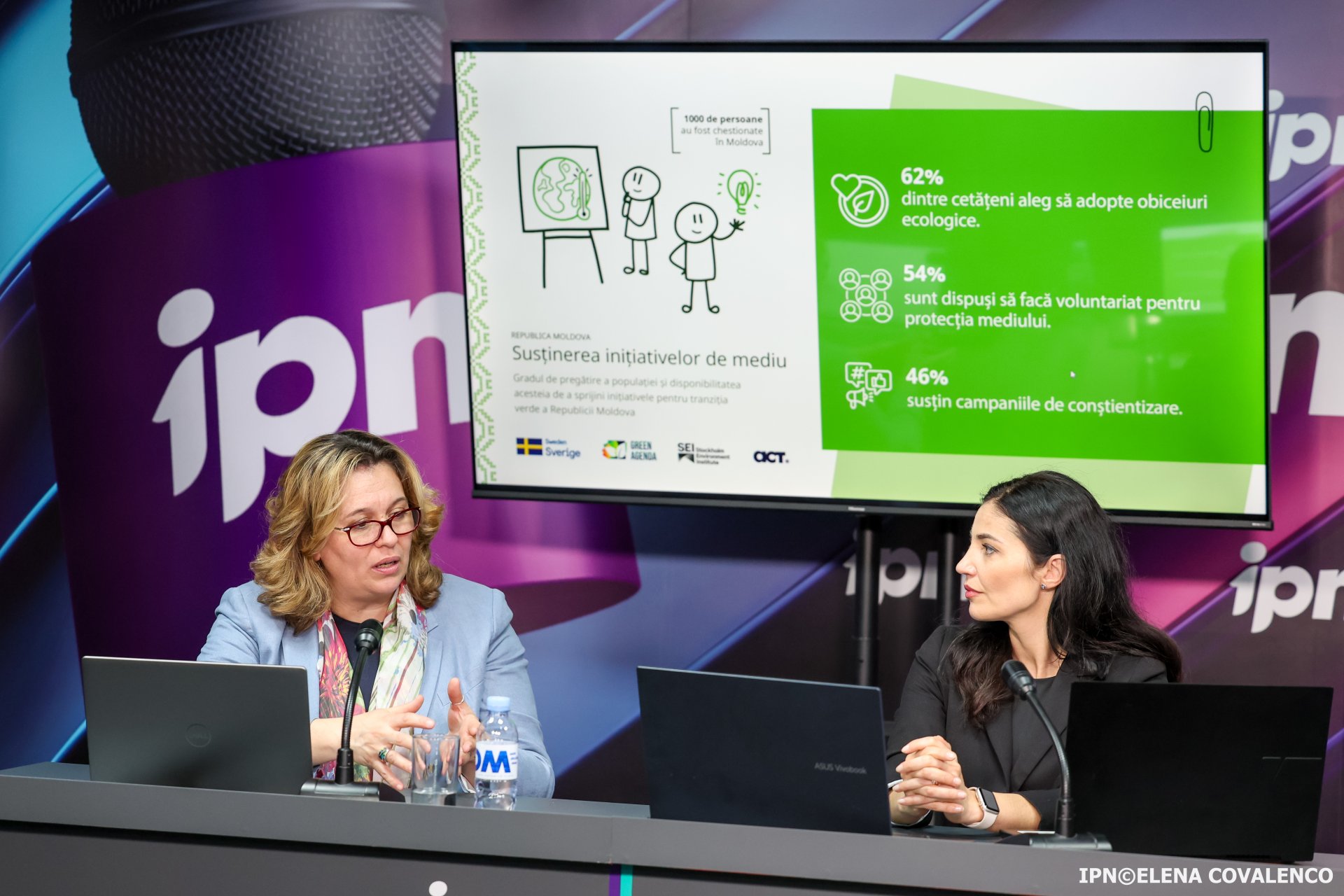
Population's support for Moldova's green transition estimated in study by Stockholm Environment Institute
A new study conducted by the Stockholm Environment Institute (SEI) and ACT Global provides relevant insights into public perceptions concerning Moldova's green transition, offering valuable recommendations for policymakers in the field of environmental and energy policies. The study analyzes the opinions of Moldovans on climate change, environmental priorities, their level of awareness, and their willingness to get involved in green initiatives.
The study was conducted under the project, Green Agenda for Armenia, Georgia, Moldova and Ukraine, funded by the Swedish International Development Cooperation Agency (Sida), and was presented during a public event held in Chisinau. Experts in the fields of environment and economy, such as Iordanca-Rodica Iordanov, co-leader of the Green Agenda project, and Stas Madan, program director at Expert-Grup, discussed the main findings and their importance for Moldova's environmental policies.
Climate Concerns and Personal Impact
Environmental concerns vary within the population, with the most frequently mentioned issues being waste management (67 per cent), air quality (58 per cent), and access to renewable energy sources (54 per cent). Also, 63 per cent of respondents indicate the decline in food quality as a major environmental problem.
As for the climate change, 73 per cent say that it affects them personally or impacts people close to them. Likewise, 85 per cent report negative effects on health, while 51 per cent mention economic difficulties caused by climate-related factors.
Although 76 per cent of respondents consider the green transition necessary, only 38 per cent have made significant lifestyle changes to reduce their adverse environmental impact.
Sources of Information and Climate Change Awareness
The study shows that 61 per cent of respondents consider their knowledge "good" (40 per cent) or "very good" (21 per cent) about climate change, while only 5 per cent evaluate it as "poor".
Sources of environmental information vary by age group and location:
• Television is the main source for people older than 45, rural residents, and retirees;
• Facebook is preferred by those aged 45–54, with vocational studies and by employees.
• Family, friends, and colleagues are key sources of information for urban residents and those with higher education.
Perception of Renewable Energy and Energy Dependency
Concerns about Moldova's dependency on external energy sources are widespread, with 65 per cent of respondents signaling this issue. At the same time, 78 per cent of young people aged 25–34 support promoting solar and wind energy sources as an alternative solution.
At the same time, 71 per cent consider renewable energy to be a more stable source than fossil fuels and 50 per cent of respondents with higher education believe the state should provide financial incentives to encourage the growth of green energy.
European Integration and International Support for Environmental Policies
The results indicate that 64 per cent of respondents see support from international organizations and donors as essential for environmental protection. Also, 40 per cent believe that integration into the European Union plays an important role in shaping Moldova's environmental policies.
Public Involvement in Environmental Protection: Challenges and Barriers
The study shows that 57 per cent of respondents actively participate in environmental protection actions, the most common being recycling and waste reduction. However, participation is limited by several factors, including:
• Lack of time (62 per cent)
• Lack of eco-friendly habits (39 per cent)
• Insufficient information about environmental initiatives (34%)
Implications and Next Steps
The study, which involved 1,000 respondents, with a margin of error of +/- 3.1%, provides a data-driven perspective on Moldovans' attitudes towards the green transition, highlighting key areas for policymakers. While public support for sustainable initiatives is significant, effective implementation depends on increasing awareness, extending financial incentives for renewable energy and addressing economic and social challenges.
Moldova strengthens relations with France in EU accession
European experts mission to review Moldova's progress in fighting corruption
Deputy Prime Minister on visit to Brussels
Moldova's EU accession negotiations progress quickly
Moldovan deputy PM says leadership manages to speed up approval of Growth Plan for Moldova
Moldovan deputy PM says European funds to be invested in infrastructure projects, to improve citizens' lives
European Parliament to open liaison office in Chisinau
EuroQuiz 2025 // Moldovan students challenged to test knowledge about European Union
Moldova not alone in 'uncertain security context'
Moldovan police to be on duty on May 1; citizens urged to observe safety rules
Moldovan energy minister says competent ministry has clear goals for attracting investments, development of renewable energy
Postal voting of Moldova to be expanded in Japan, Australia
Ukrainian deputy PM for European Integration on visit to Chisinau
Journalist Vasile Botnaru - new member of Audiovisual Council
Moldova to join Hague Convention
Water quality legislation to be aligned with European standards
Secondary school graduates to have access to videos and interactive lessons to prepare for math exam
Another judge of Court of Appeal Center passes external evaluation
EcoContact organizes photo exhibition - Focus on Nature: Protected Areas Through Lens
VIDEO // Construction site of Vulcanesti-Chisinau line expanded over 110 kilometers
Moldovan pupils win silver medal and three bronze medals at Balkan Mathematics Olympiad
Today - last day for individuals to submit Income Tax Declaration for 2024
Moldovan president has discussions Sweden's PM
Moldovan president's message at Congress of European People's Party
Moldovan president at EPP Congress says accession of Moldova, Ukraine's to EU to strengthen Europe


